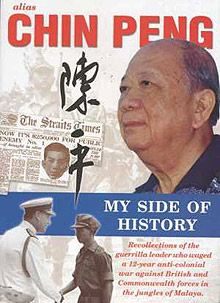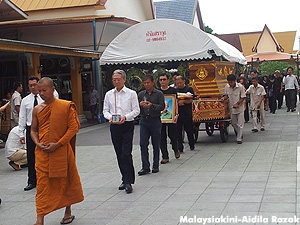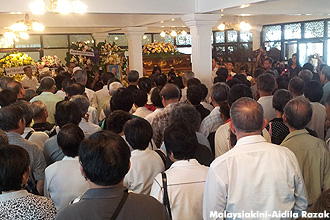VIEWPOINT On the second day of Chin Peng's wake, I woke up humming L'Internationale.
Composed by French leftists, the socialist anthem was repeatedly played from 10am to 8.30pm everyday during the four-day wake and funeral, an unintentional soundtrack to my journey.
For four days, I was at once in different realms - on assignment in a large Buddhist temple complex in Bangkok's business district and in a communist propaganda film with Bolshevik hats and Mao Tse-tung on loop.
 At the same time, I was at a gathering of old folks, with tea, cakes and ice-cream, and at a history lesson about a place that was supposed to be my home, but sounded so foreign.
At the same time, I was at a gathering of old folks, with tea, cakes and ice-cream, and at a history lesson about a place that was supposed to be my home, but sounded so foreign.
My teachers were men and women with thinning hair and smiling eyes who, despite their advanced age, walked straight, with easy gait and spoke to me in Bahasa Malaysia, English or Mandarin (through an interpreter).
In a different world - in Kuala Lumpur, my home, which is just a two-hour flight way - these men and women are 'bloodthirsty, ruthless killers'.
Here, these people, the aunties and uncles, on Day 2 prepared a halal food pack especially for me, the only Muslim journalist covering the funeral of the former leader of the Communist Party of Malaya.
They were not always kind and accommodating. On the first day, one woman, who was among the organisers, turned her face away and said: "No! No! No! Malaysian media, no!" when I asked her the name of a Thai VIP visitor I did not recognise.
Later, the same woman sought me out and pointed to important things that were taking place during the Buddhist rituals, her distrust and anger reconsidered.
In the same fashion, several people would approach me and ask if I was Aidila Razak from Malaysiakini who wrote this or that article. Terrified that they could be upset over what I had written, I would meekly say "Yes", only to be met with a handshake or a smile.
In a quote I once read, someone said a man's life is well-lived if four friends attend his funeral.
For four days, Chin Peng's family and friends would loyally pace the temple grounds, sitting close to his remains, preparing mementoes for guests and attending to mourners who came in a steady stream.
Chin Peng a very private person
Discussing Day 1, my colleague and I agreed that if not for the presence of journalists, it would be just like the wake for any old man - a private, quiet and sombre affair on a rainy day.
Chin Peng would have wanted it that way, his family said. He was a private person, with no wont for grandeur or publicity. So private that some of his family members didn't even know where his house was, having only met him in restaurants or hotels in Bangkok, the city where he lived in exile until his last days.
 His niece, who cared for him until his final breath, and her brothers who organised the wake and funeral may have known, but they kept this information closely guarded.
His niece, who cared for him until his final breath, and her brothers who organised the wake and funeral may have known, but they kept this information closely guarded.
When the undertakers transferred his body into the coffin at the temple, the family stood around him to block photographers, shielding him even in his death. They would protect their cousin - Chin Peng's son - the same way.
(Personally, I was relieved that members of the media who did manage to take pictures of the body did not publish them. I was even more relieved when all the reporters present respected the family's request for the son's privacy.)
What inspires such loyalty and love?
One old comrade, now in a wheelchair, sought to be lifted out of his chair so he could bow properly to Chin Peng, whose body lay in a closed casket for three days before being placed into the furnace at the crematorium.
Others travelled close to 24 hours by road on journeys that would have broken my young back, let alone those bones that have withstood decades of fighting.
"Lama, tapi kita boleh jalan-jalan sikit bila van berhenti isi gas (It's a long journey but we can stretch our legs when the van stops for fuel)," one woman said, dismissing the arduousness of the journey she would repeat immediately after the cremation.
Most of the mourners came in a sudden wave on Day 3, filling Wat That Thong's Court 11 with a boom of sudden chatter so loud at the half-wake, half-reunion that I had to go to the rest room to hear myself think.
Fighting for the dignity of man
Perhaps for many of them, including Muslim ex-CPM fighters who travelled from Yala and Narathiwat, almost everything pales in comparison to decades in the jungle.
Historians would say that many factors drove the CPM to continue fighting, even after Independence.
During the 1955 Baling Talks, Chin Peng, then only a few years older than I am now, said that what he was still fighting for was the "dignity of man".
Speaking to these old folks, I realise it was a fight for their own liberation, for them to live free and dignified after their long struggle for the nation's liberty.
Some of those I met joined the guerrilla army post-1957 for reasons that may sound selfish (for example, to escape abject poverty). Would I have done the same if pushed into such a corner? As a child of fortitude, I would never know.
If Chin Peng had surrendered, would these men and women have been able to live that life of dignity?
 Those who themselves or had family members maimed, injured or even killed at the hands of communists would contend that these men and women do not deserve such a life.
Those who themselves or had family members maimed, injured or even killed at the hands of communists would contend that these men and women do not deserve such a life.
The scars they bear cannot be diminished. As someone who did not suffer the same, I cannot even begin to fathom their pain. I would not judge their bitterness.
In those four days in Bangkok, the men and women I met, too, showed moments of bitterness - from battles long fought, scars long hidden and loved ones lost in death and distance.
But even so, they were brief and fleeting, washed away by moments such as the eruption of laughter when one of them, now hard of sight, walked straight into a sliding door.
I would not begrudge them a life of dignity.
AIDILA RAZAK covered Chin Peng's wake and funeral for Malaysiakini in Bangkok, Thailand, from Sept 20 to 24. Grateful to have been a witness of history, she hopes as many friends would attend her funeral when her time comes.
Related stories

